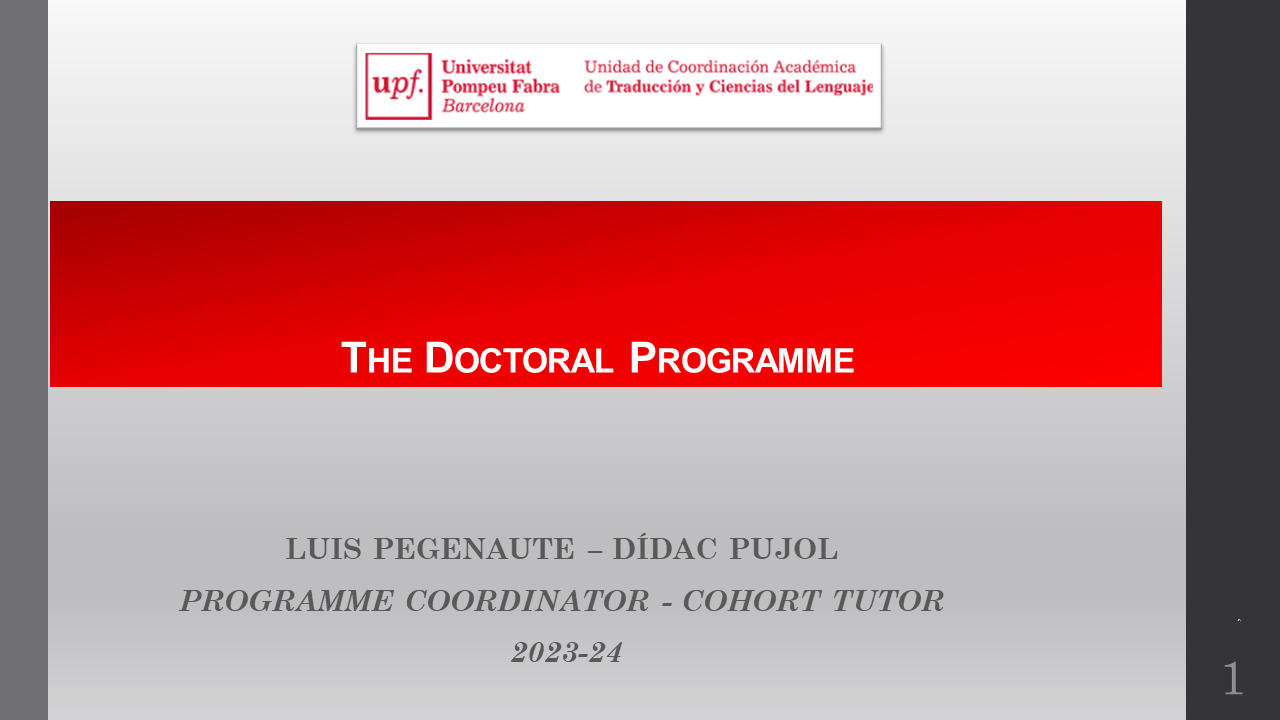Presentation

For an overview of the programme click here.
Admission profile
The PhD programme of Translation and Language Sciences is aimed primarily at individuals trained on language and/or translation Undergraduate and Master's degree studies, and interested in research on these subjects at a higher level. Doctoral training, which includes the doctoral research period, links with the areas of work of the Department's four Master’s programmes (Master’s in Theoretical and Applied Linguistics, Master’s in Discourse Studies, Master’s in Translation Studies, Master’s Degree in Translation among Global Languages: Chinese-Spanish), as well as with the lines of research of its research groups, discussed further below. Candidates for admission to the programme are students from any background who meet some facet of this profile, very often more than one. The fact that it is an interdisciplinary programme, with multiple fields of research, also makes it attractive for students with an education other than in language and translation, such as psychology, pedagogy, engineering or humanities; the plan of first year training activities means that this diversity does not affect the ability of doctoral students to carry out their doctoral research.
Students who have completed a research Master's and other students in similar situations (*) can begin doctoral research in one of ten lines of research, linked to research groups in Translation and Language Sciences:
| Translation Studies |
| Specialised Translation |
| Literary Reception and Translation |
| Discourse Analysis |
| Language Acquisition |
| Language Learning |
| Lexicology and Lexicography |
| Terminology and knowledge Management |
| Formal and Descriptive Linguistics and Language Variation |
| Computational Linguistics and Language Engineering |
Annually 30 places are offered. Check the admission requirements and the pre-registration calendar.
Here is the form to request the endorsement of a programme professor.
Predoctoral training
The period of research training should provide the doctoral student with the capacity to develop autonomously, to enrich themselves by working in different environments and to advance knowledge. Accordingly, in addition to the specific research competencies in the field that is specific to each doctoral thesis, the training of a researcher in the PhD Program on Translation and Language Sciences (PDTCL) should provide the student with the skills and abilities:
(a) to master advanced research techniques
(b) to make both rigorous and original research contributions
(c) to guide their own research career autonomously
(d) to participate actively in different research groups other
(e) to articulate and adapt their own research in various environments and projects
(f) to optimise the dissemination and impact their own research
(g) to critically assess the research within its own and related fields
(h) to justify the importance of their own research to non-experts
The results of the doctoral training period are embodied within the doctoral thesis, which may be a monograph or a compendium of articles, in accordance with the regulations established by the programme.
The programme envisages, for some of the profiles, the incorporation of industrial doctoral projects inscribed in the Industrial Doctorates Plan of the Generalitat de Catalunya.
The doctoral training period includes a series of training activities that the student must undertake in addition to the specific research leading to the doctoral thesis. During the first year, the students' training activities include, as a minimum, the following activities foreseen in the Doctoral Seminar. By the end of the first year, the student must have produced a research plan, which must include a description and motivation for the research objectives to be achieved and a methodological, material and temporal planning to demonstrate feasibility.
The main professional opportunities for doctoral students on the programme are in the fields of teaching, university or pre-university, research and public administration. For more information, you can consult Carreras profesionales and Alumni UPF.
(*) In addition to people who have obtained a research master's degree, people who have a Diploma of Advanced Studies (DEA) or other types of master's degrees can also apply for admission to the doctoral program, subject to the conditions set out by the University. (More information.)
Doctorate Coordinator: Luis Pejenaute Rodríguez
Doctoral research projects are assigned to one of the programme's lines of research, carried out in a research group and led by a programme researcher:
Learning Resources Information
Information on grants and contracts
Click here for the general portal on grants and scholarships for doctoral students.
Also consult the Department's website for the offer scholarships and pre-doctoral contracts:
- Work at the DTCL. Teaching jobs
- 2 DTCL predoctorals contracts for 2023-2024
- Scholarships and grants for postgraduate students
- DTCL Grant "Estada"
- DTCL Grant "Presenta"
